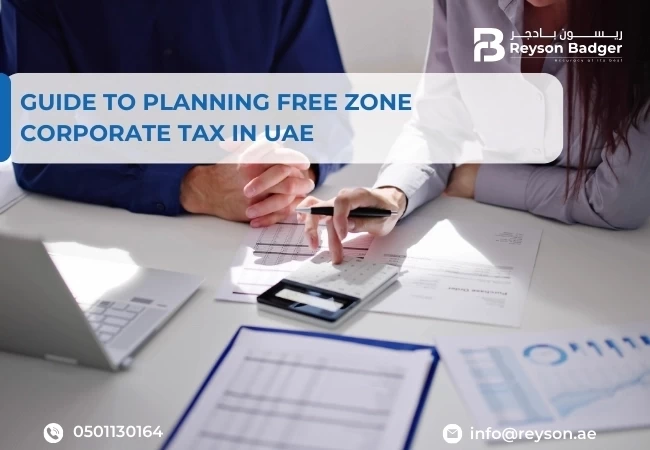Guide to Planning Freezone Corporate Tax in UAE
Written By Akshaya Ashok, Reviewed By Reyees K P
Published on 13/01/2025

- 0% Corporate Tax Rate: Qualifying Free Zone Persons (QFZPs) can enjoy a 0% tax rate on qualifying income. Businesses must fulfill certain requirements set by the UAE tax authorities to be eligible.
- 9% Corporate Tax Rate: Non-Qualifying Free Zone Persons (NQFZPs) or income that does not meet the qualifying criteria will be subject to a 9% corporate tax rate on taxable income exceeding AED 375,000.
This framework aims to maintain the attractiveness of UAE Free Zones for international investors while contributing to the broader economic landscape through structured taxation.
Taxable Income and Deductions for Free Zone Businesses
Taxable income for Free Zone businesses includes all revenue generated from their operations. However, to determine which income qualifies for the 0% tax rate, specific criteria must be met:
- Qualifying Income: This includes:
- High-sea sales (transactions related to products delivered while still in transit).
- Revenue from direct exports of items from the Free Zone to countries outside of the United Arab Emirates.
- Deals with other Free Zone companies (sales or services that are only offered inside the Free Zone.
- Non-Qualifying Income: Any income derived from mainland activities or non-qualifying sources may be taxed at the standard 9% rate.
- Deductions: Similar to other business entities, Free Zone companies can deduct allowable expenses related to generating taxable income, such as operational costs, salaries, and depreciation.
What are the Tax Registration and Filing Requirements for Free Zone Businesses?
All businesses operating in UAE Free Zones must comply with specific corporate tax registration and filing requirements:
- Tax Registration: Every Free Zone business must register with the Federal Tax Authority (FTA) to obtain a Tax Registration Number (TRN), irrespective of whether they are liable to the regular 9% tax rate or are eligible for the 0% tax rate.
- Annual Tax Returns: Once registered, businesses are required to file annual corporate tax returns detailing their taxable income, deductions, and any applicable exemptions within nine months after their financial year-end.
- Regulation Compliance: To keep their qualifying status and take advantage of the 0% tax rate, businesses must abide by the Economic Substance Regulations (ESR) and transfer pricing guidelines.
Corporate Tax Planning Strategies for Free Zone Businesses
Transfer pricing refers to the pricing of goods, services, and intangibles between related parties, such as subsidiaries within a corporate group. For Free Zone businesses engaged in transactions with related entities, implementing effective transfer pricing strategies is essential to comply with the UAE's regulations:
- Arm's Length Principle: Ensure that all intercompany transactions are priced as if they were conducted between unrelated parties. This helps avoid disputes with tax authorities and potential penalties.
- Documentation: Maintain comprehensive documentation to support the pricing methods used. This includes contracts, invoices, and any analyses conducted to determine arm's length prices.
- Benchmarking Studies: Conduct benchmarking studies to compare prices charged in similar transactions within the market. This offers a strong basis for defending the established prices.
Tax Loss Utilization
Utilizing tax losses effectively can significantly minimize tax liabilities for Free Zone businesses:
- Offsetting Profits: Free Zone companies can offset taxable profits with prior-year losses, reducing the overall taxable income. This is particularly beneficial for businesses that experience fluctuating revenues.
- Loss Carryforward: Understand the rules regarding loss carryforwards under UAE tax law. Ensure that records of losses are well-documented and filed correctly to take advantage of this provision in future tax periods.
Tax Credits
Claiming tax credits can provide substantial benefits for Free Zone businesses:
- Double Taxation Treaties (DTTs): Leverage DTTs that the UAE has established with various countries to avoid double taxation on income earned abroad. This can reduce the effective tax rate on foreign income.
- Foreign Tax Credits: If a Free Zone business pays taxes in another jurisdiction, it may be eligible for foreign tax credits against its UAE tax liability, thereby minimizing overall tax exposure.
Group Taxation
For businesses operating multiple entities, utilizing group taxation can streamline tax obligations:
- Consolidated Tax Returns: Forming a corporate tax group allows related companies to file a single consolidated tax return, simplifying compliance and potentially optimizing overall tax liabilities.
- Loss Sharing: Within a corporate tax group, profitable entities can use losses from other group members to offset their taxable income, effectively reducing the group's overall tax burden.
- Strategic Structuring: Careful planning in structuring the group can maximize benefits while ensuring compliance with UAE regulations regarding corporate tax groups.
By implementing these corporate tax planning strategies, Free Zone businesses can optimize their tax positions, ensure compliance with regulatory requirements, and enhance their overall financial performance in the UAE's evolving corporate tax landscape.
Tips for Optimizing Corporate Tax Planning in UAE Free Zones
Maintain Accurate Records
Maintaining accurate and detailed financial records is critical for Free Zone businesses to ensure compliance with corporate tax regulations and optimize tax planning:
- Complete Documentation: Maintain accurate records of every transaction, including buying, selling, and spending. This documentation supports claims for deductions and demonstrates compliance with tax regulations.
- Segregation of Income: Differentiate between qualifying and non-qualifying income to ensure proper tax treatment. To keep your position as a Qualifying Free Zone Person (QFZP), you must do this.
- Regular Updates: Update financial records regularly to reflect current business activities and financial positions, facilitating timely corporate tax filings.
Seek Professional Advice
Engaging experienced tax professionals can provide valuable insights and guidance for Free Zone businesses:
- Expert Knowledge: Tax professionals are well-versed in the complexities of UAE tax laws and can help navigate the regulatory landscape effectively.
- Tailored Strategies: Professionals can develop customized tax strategies that align with the specific needs of your business, maximizing available deductions and credits.
- Compliance Assurance: Consulting with experts ensures that all tax filings are accurate and compliant, reducing the risk of penalties or disputes with tax authorities.
Stay Up-to-Date with Tax Laws and Regulations
The corporate tax landscape in the UAE is evolving, making it essential for businesses to stay informed about changes:
- Regular Monitoring: Keep abreast of updates to corporate tax laws, regulations, and guidelines issued by the Federal Tax Authority (FTA) to ensure compliance.
- Training and Workshops: Participate in training sessions or workshops focused on corporate tax planning and compliance to enhance understanding of current requirements.
- Networking: Engage with industry peers and professional networks to share insights and experiences related to tax planning strategies in Free Zones.
Conduct Regular Tax Reviews
Conducting regular tax reviews is vital for identifying areas for optimization:
- Periodic Assessments: Regularly assess your business’s financial performance and tax position to identify potential savings or areas needing improvement.
- Identify Opportunities: Look for opportunities to claim additional deductions or credits that may have been overlooked in previous filings.
- Adjust Strategies: Based on review findings, adjust your tax planning strategies to better align with your business goals and maximize benefits under the Free Zone regime.
Mistakes to Avoid in Corporate Tax Planning for Free Zone Businesses
- Failure to Register for Tax: Failing to register with the FTA can lead to penalties, fines, and loss of eligibility for the 0% tax rate.
- Inaccurate or Incomplete Tax Filings: Errors in tax returns can trigger audits, penalties, and higher tax assessments, and may disqualify businesses from the 0% tax rate.
- Failure to Maintain Accurate Records: Neglecting to maintain accurate financial records can lead to difficulties during audits, penalties, and loss of eligibility for tax benefits.
Conclusion
Planning Free Zone Corporate tax in UAE is really important for Free Zone businesses. It helps them manage the rules around taxes in the country. By knowing how taxes affect their work, keeping clear records, and steering clear of common errors, businesses can lower their tax bills and improve their profits. As tax rules in the UAE change, Free Zone businesses need to stay updated and get expert help when needed. At Reyson Badger, our team is ready to offer guidance and support. We're here to help businesses make the most of their tax plans and reach their financial goals.

Written By
Akshaya Ashok
Akshaya Ashok is a content writer specializing in creating content focused on accounting and auditing. With over two years of experience, she has developed expertise in crafting professional content for the financial sector.

